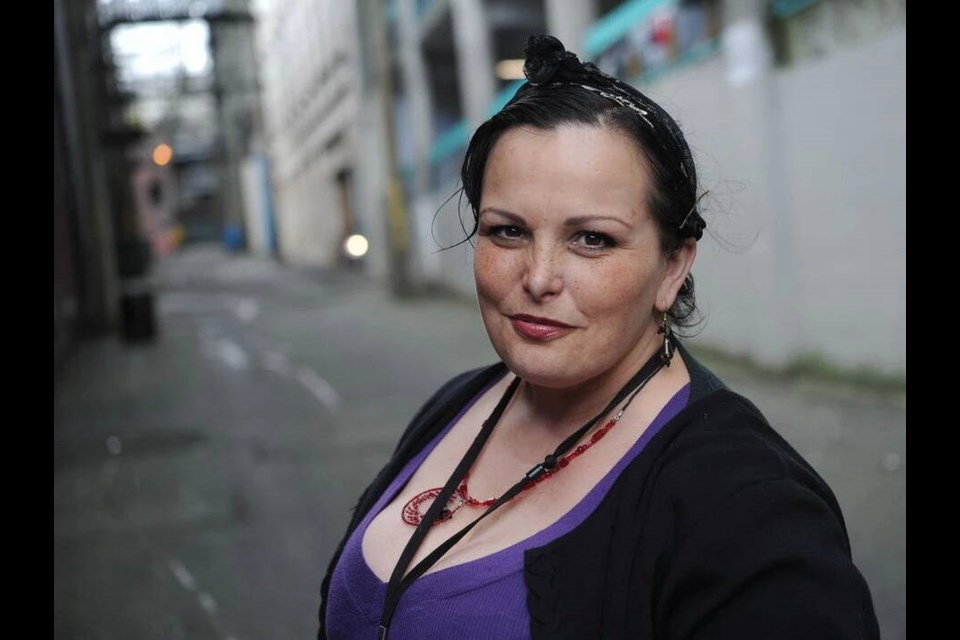A Vancouver Island woman who came to international prominence as an activist for sexually exploited youth has died after COVID-19 ripped through the Nanaimo street community.
Cherry Kingsley, a recipient of a 2000 Governor General’s Award that recognizes contributions to gender equality, had slipped back into addiction and was living in a homeless shelter in Nanaimo before her death at 52 from COVID complications on Nov. 30.
“Like a shooting star, Cherry Kingsley blazed bright but last week she left us too soon and wanting more,” Sen. Kim Pate said Tuesday in the Senate. “She challenged us to recognize the misogyny, racism and class bias of ordinary men — fathers, husbands, grandfathers, uncles and brothers, particularly men in significant positions of privilege who objectified, dehumanized, used and abused children and young women.”
Pate called Kingsley “brilliant, articulate, courageous, generous and caring” and said she demanded recognition that children were trafficked and exploited in the sex trade and were not willing participants.
Kingsley was raised in an abusive home, beaten by her mother and stepfather. She was 10 when she and her sister ran away, walking the railway lines in Alberta from Calgary to Cochrane for three days before they were apprehended, separated and placed in foster care. Kingsley had 20 placements over the next eight years and often ran away.
At 15, she turned to drugs and prostitution. She was abused and traumatized by many, and trafficked between Calgary and Vancouver. In 1990, Kingsley was raped and nearly murdered by a john who pulled a gun on her in Stanley Park. She resolved to turn her life around and leave the sex trade and drugs. In 1991, when she realized she was pregnant, she promised to commit her life to working for disadvantaged youth. Her son, Dakota, was born the following year.
UNICEF invited her to address the World Congress Against Commercial Exploitation of Children in 1996, and two years later, with Sen. Landon Pearson, Kingsley co-chaired Out of the Shadows, an international summit on sexually exploited youth held in Victoria.
Jody Paterson was in management at the Times Colonist when Kingsley convinced her to get the newspaper to promote the summit.
“She was a beautiful bundle of energy with those eyes and her ways,” said Paterson. “She was going to bring in sexually exploited youth from all over the Americas. It seemed pretty big for Victoria at that time. But it was happening. We were all under Cherry’s spell.”
Paterson called Kingsley a “rock star” — “When she stepped up to the stage and spoke, you could feel people’s money coming straight out of their pockets” — but said she didn’t have the skills to survive in the world, and needed a lot of support to make good choices.
Paterson said telling her story came with a price for Kingsley. “What we wanted was the sad story of a young sexually exploited youth to build support and raise awareness of the issue. But when people are asked to tell their stories, it holds them in a traumatic place. It’s basically asking them to talk about their painful life memories to help the issue. And it’s the wrong thing to do.”
Kingsley had a hard life and it never got much easier, said Paterson.
“In the grand scheme of her 52 years, there weren’t very many periods where she was a rock star,” she said. “All her early experiences were broken and sad and lonely.”
In 2010, NDP cabinet minister Melanie Mark worked with Kingsley on Sacred Lives, a report on sexual exploitation of Aboriginal children and youth. Mark said Kingsley brought to light the global impact of child trafficking. “She spoke from her heart about the horrors she experienced as a young person and brought street cred to the issue because of her own lived experience.”
Mark said Kingsley played an instrumental role in her life, “always encouraging me to have courage and speak out for those who don’t have a voice.”
Gord Fuller, who ran the 7-10 Club in Nanaimo, met Kingsley when the Prideaux Street shelter opened last year.
“She always seemed happy and cheerful and was really looking forward to being in supportive housing,” he said.
Aimee Chalifoux, a sex-trafficking survivor and outreach worker, studied Kingsley’s work when she was at university and became friends with her a few months ago. She said their stories were similar. “I couldn’t help but cry when I met her. We bonded immediately.”
Kingsley wanted Chalifoux to write her story. But Kingsley became ill with COVID and was admitted to hospital, unable to breathe. “She was fiercely brave. She just didn’t want to be alone and she wasn’t. Her friends from where she lived stayed with her round the clock. She wanted the people who loved her to be there with her.”
Chalifoux said she would not be speaking out and sharing her story if wasn’t for Kingsley. “I would not have believed that someone like me, who could grow up the way that I did, had anything worthwhile to say. I didn’t believe that about myself until I heard her speak.”
ldickson@timescolonist.com



